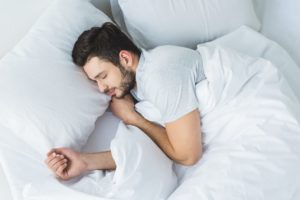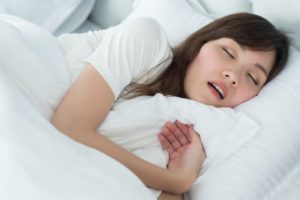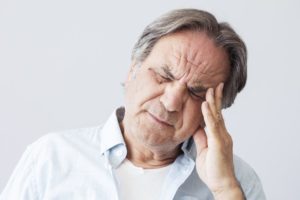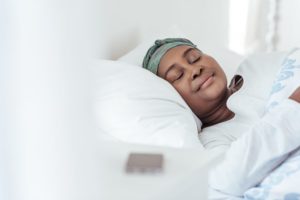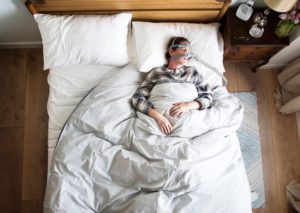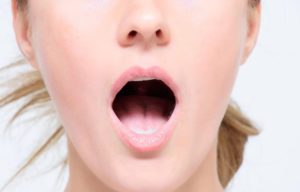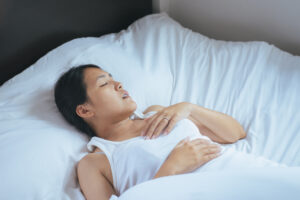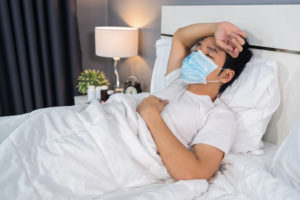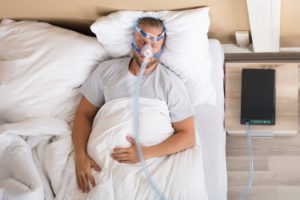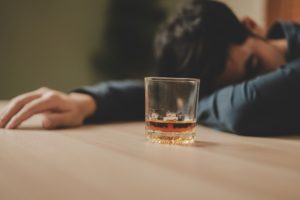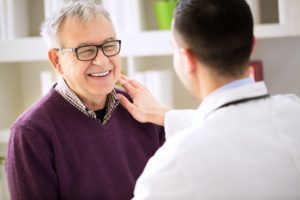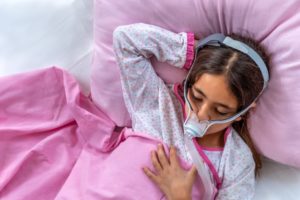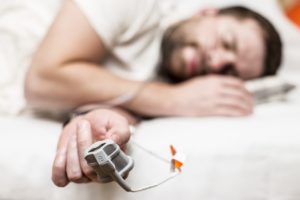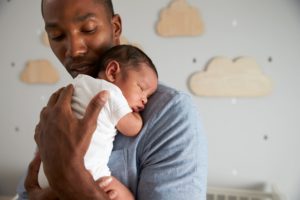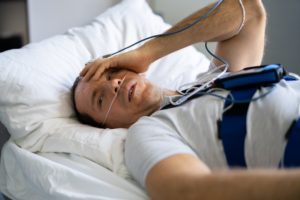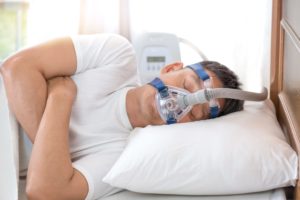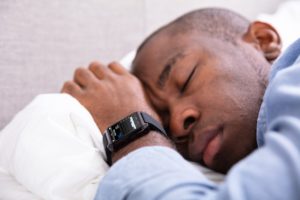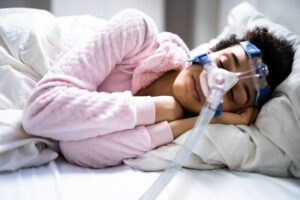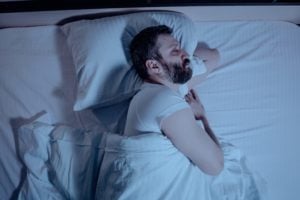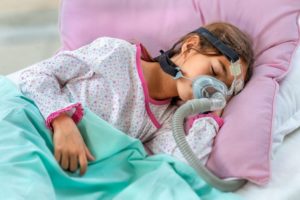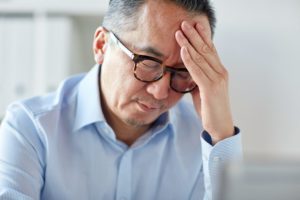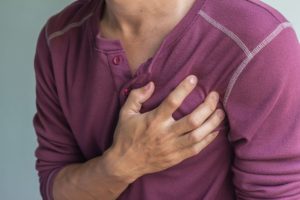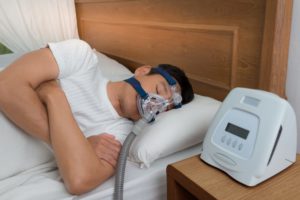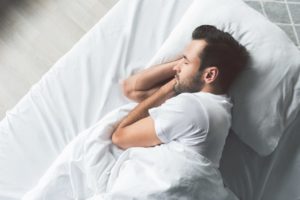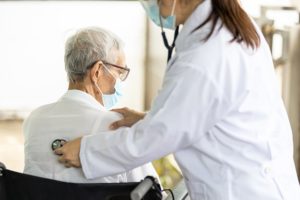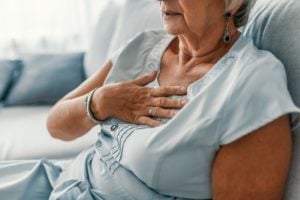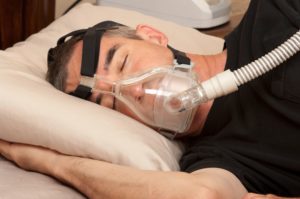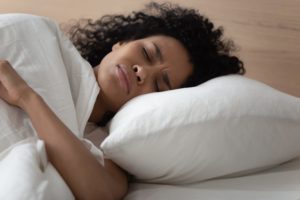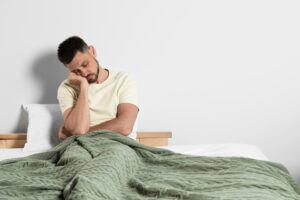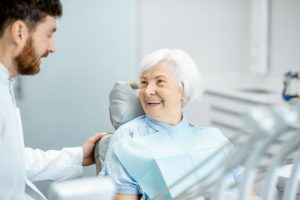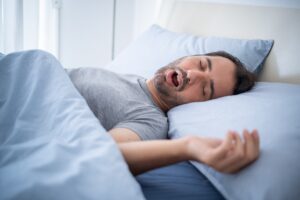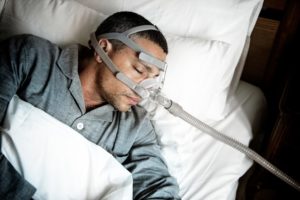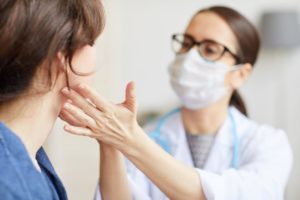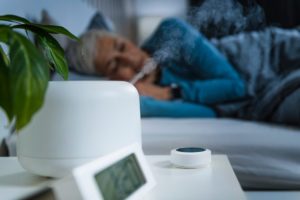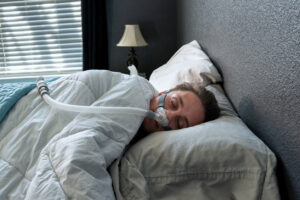When you buy through our links, we may earn a commission. Products or services may be offered by an affiliated entity. Learn more.
The Link Between Sleep Apnea and Teeth Grinding
- Although the correlation is unclear, many people with sleep apnea also have sleep-related bruxism.
- Experts suggest mouth muscles trying to reopen the airway narrowed by sleep apnea may lead to teeth grinding.
- Research has not concluded whether or not sleep apnea and bruxism are interconnected or occur independently.
- Oral appliances to treat sleep apnea may help manage teeth grinding.
Some sleeping problems tend to go unnoticed. If the main symptoms can’t be perceived by a person when they are sleeping, they may not be aware of the problem.
That is the case for both obstructive sleep apnea (OSA) and sleep-related bruxism. OSA is a disorder characterized by diminished oxygenation with or without awakening due to increased breathing effort as the upper airway becomes obstructed to some degree. One’s bed partner may report loud snoring, gasping, choking, snorting or interruptions in breathing while sleeping. Sleep-related bruxism involves repetitive jaw-muscle activity during sleep, often characterized by teeth grinding or clenching.
Multiple types of research studies have found a higher-than-expected percentage of people have both OSA and sleep-related bruxism. While there are several potential explanations for this co-occurrence, further research will be necessary to clarify the nature of the relationship between these conditions.
Understand Your Sleep Apnea Risk
Answer three questions to take charge of troubled sleep.
Is There a Connection Between Sleep Apnea and Teeth Grinding?
With a broad definition, OSA has been estimated to affect approximately 15-30% of males and 10-30% of females . Using a more restrictive definition, 2-9% of adults are affected and up to 5% of children at any age. However, it is often believed to be underdiagnosed .
In addition to looking at their prevalence independently, studies have found that a surprising number of people have both OSA and sleep-related bruxism. In fact, one of the main risk factors for sleep-related bruxism is OSA. To date, though, it’s still unclear whether there is causation or only correlation.
Epidemiological studies, which examine patient records and datasets, identified that many people with OSA were also prone to grind their teeth . Though not all of these studies have found the same rates of co-occurrence, a general pattern emerged showing a correlation between teeth grinding and sleep apnea.
The same correlation has also been found in studies using polysomnography, which is a type of in-depth sleep study done in a specialized clinic. Because it involves close observation of a sleeper, polysomnography provides greater confidence than some other studies that rely on surveys of self-reported sleep apnea or teeth grinding.
Possible Explanations for a Relationship Between Sleep Apnea and Sleep-Related Bruxism
While research studies have shown a correlation between sleep apnea and sleep-related bruxism, they don’t clearly explain the underlying nature of that association.
Sleep scientists have formulated several hypotheses about how these conditions are connected. It is important to highlight that research so far has not been able to establish any of them as definitive or to show conclusively that there is a direct connection between teeth grinding and sleep apnea.
Obstructive Sleep Apnea as a Risk Factor for Sleep-Related Bruxism
Some argue that when the airway becomes constricted from OSA, movement of the muscles of the mouth that are involved in chewing, may help to reopen it leading to teeth grinding. Another possibility is that the clenching and grinding helps to lubricate the tissue in the back of the throat that can become dried out from labored breathing from sleep apnea.
In this view, sleep-related bruxism is seen as part of the body’s response to try to protect itself from the effects of OSA. Even though it may not apply to all people with OSA, this hypothesis may describe a subset of OSA patients who experience teeth grinding subsequent to disturbed breathing episodes during sleep.
Sleep Bruxism as a Risk Factor for Obstructive Sleep Apnea
A less common view is that sleep bruxism may be a contributing factor to sleep apnea. The underlying mechanism by which this may occur has to do with signals from the nervous system that affect heart rate, muscles around the jaw, and the nasal passages. Signals that initiate teeth grinding may also increase congestion and airway restriction, creating disordered breathing .
A challenge to this view is that sleep studies of people with both sleep-related bruxism and OSA have found that teeth grinding episodes precede OSA-related breathing episodes only about 25% of the time.

Obstructive Sleep Apnea and Sleep Bruxism Occur Independently
Another potential explanation is that OSA and sleep-related bruxism are correlated but that there is no causal link from one to the other. Instead, the two conditions arise independently of one another, although they could both be related to another, separate cause.
An argument in favor of this hypothesis is that a consistent pattern of OSA and teeth grinding hasn’t been found in studies to date. While it is more common for teeth grinding to happen shortly after disrupted breathing, it can also happen before and at other points during sleep.
Given this inconsistency, a separate mechanism may influence the development of OSA and sleep-related bruxism and make them more likely to co-occur. Early research has identified abnormalities in pathways of dopamine and serotonin, chemicals of the nervous system known as neurotransmitters, as one possible underlying mechanism .
Obstructive Sleep Apnea and Sleep Bruxism Have a Multifaceted Relationship
According to some expert opinions, there is a multifaceted and complex relationship between sleep apnea and teeth grinding that can manifest in distinct ways in different individuals .
OSA is a complicated disorder that involves the nervous, cardiovascular, and respiratory systems. Similarly, there can be diverse contributing factors to sleep bruxism, including both genetic and environmental factors as well as a person’s weight, anatomy, and sleeping position. The complexity of each of these conditions could explain the inconsistent and inconclusive findings in research studies conducted so far.
What is the Significance of the Relationship Between Sleep Apnea and Sleep Bruxism?
Until future research uncovers the exact nature of the relationship between these conditions, people who have OSA or sleep-related bruxism should be aware that they may occur together. This can help them be on the lookout for symptoms and raise the issue with their doctor who can determine whether further testing or treatment would be beneficial.
When both conditions are present, their identification may play a role in optimizing treatment. For example, a case study revealed that therapy with a positive airway pressure (PAP) device, successfully treated both conditions . In addition, some mouthpieces, such as mandibular advancement devices (MADs) that hold the tongue and lower jaw forward, may help treat OSA and also reduce teeth grinding .

Still have questions? Ask our community!
Join our Sleep Care Community — a trusted hub of sleep health professionals, product specialists, and people just like you. Whether you need expert sleep advice for your insomnia or you’re searching for the perfect mattress, we’ve got you covered. Get personalized guidance from the experts who know sleep best.
References
16 Sources
-
Young, T., Palta, M., Dempsey, J., Peppard, P. E., Nieto, F. J., & Hla, K. M. (2009). Burden of sleep apnea: rationale, design, and major findings of the Wisconsin Sleep Cohort study. WMJ : official publication of the State Medical Society of Wisconsin, 108(5), 246–249.
https://www.ncbi.nlm.nih.gov/pmc/articles/PMC2858234/ -
Peppard PE, Yound T, Barnet JH, et al. Increased prevalence of sleep-disordered breathing in adults. Am J Epidemiol 2013; 177:1006.
https://pubmed.ncbi.nlm.nih.gov/23589584/ -
Strohl, K. P. (2020, September). Obstructive sleep apnea in children. Merck Manual Professional Version., Retrieved July 21, 2020, from
https://www.merckmanuals.com/professional/pulmonary-disorders/sleep-apnea/obstructive-sleep-apnea-in-children -
Rosen CL, Storfer-Isser A, Taylor HG, et al. Increased behavioral morbidity in school-aged children with sleep-disordered breathing. Pediatrics 2004; 114:1640.
https://pubmed.ncbi.nlm.nih.gov/15574628/ -
Rundo J. V. (2019). Obstructive sleep apnea basics. Cleveland Clinic journal of medicine, 86(9 Suppl 1), 2–9.
https://pubmed.ncbi.nlm.nih.gov/31509498/ -
Hosoya, H., Kitaura, H., Hashimoto, T., Ito, M., Kinbara, M., Deguchi, T., Irokawa, T., Ohisa, N., Ogawa, H., & Takano-Yamamoto, T. (2014). Relationship between sleep bruxism and sleep respiratory events in patients with obstructive sleep apnea syndrome. Sleep & breathing = Schlaf & Atmung, 18(4), 837–844.
http://link.springer.com/10.1007/s11325-014-0953-5 -
Martynowicz, H., Gac, P., Brzecka, A., Poreba, R., Wojakowska, A., Mazur, G., Smardz, J., & Wieckiewicz, M. (2019). The Relationship between Sleep Bruxism and Obstructive Sleep Apnea Based on Polysomnographic Findings. Journal of clinical medicine, 8(10), 1653.
https://pubmed.ncbi.nlm.nih.gov/31614526/ -
da Costa Lopes, A. J., Cunha, T., Monteiro, M., Serra-Negra, J. M., Cabral, L. C., & Júnior, P. (2020). Is there an association between sleep bruxism and obstructive sleep apnea syndrome? A systematic review. Sleep & breathing = Schlaf & Atmung, 24(3), 913–921.
http://link.springer.com/10.1007/s11325-019-01919-y -
Saito, M., Yamaguchi, T., Mikami, S., Watanabe, K., Gotouda, A., Okada, K., Hishikawa, R., Shibuya, E., & Lavigne, G. (2013). Temporal association between sleep apnea-hypopnea and sleep bruxism events. Journal of sleep research, 10.1111/jsr.12099. Advance online publication.
https://onlinelibrary.wiley.com/doi/10.1111/jsr.12099 -
Tan, M., Yap, A. U., Chua, A. P., Wong, J., Parot, M., & Tan, K. (2019). Prevalence of Sleep Bruxism and Its Association with Obstructive Sleep Apnea in Adult Patients: A Retrospective Polysomnographic Investigation. Journal of oral & facial pain and headache, 33(3), 269–277.
http://www.quintpub.com/journals/ofph/abstract.php?iss2_id=1623&article_id=18895 -
Balasubramaniam, R., Klasser, G., Cistulli, P., & Lavigne, G. J. (2014). The Link between Sleep Bruxism, Sleep Disordered Breathing and Temporomandibular Disorders: An Evidence-based Review., Retrieved August 27, 2020, from
https://aadsm.org/docs/JDSM.1.1.27.pdf -
Saito, M., Yamaguchi, T., Mikami, S., Watanabe, K., Gotouda, A., Okada, K., Hishikawa, R., Shibuya, E., Shibuya, Y., & Lavigne, G. (2016). Weak association between sleep bruxism and obstructive sleep apnea. A sleep laboratory study. Sleep & breathing = Schlaf & Atmung, 20(2), 703–709.
http://link.springer.com/10.1007/s11325-015-1284-x -
Wieckiewicz, M., Bogunia-Kubik, K., Mazur, G., Danel, D., Smardz, J., Wojakowska, A., Poreba, R., Dratwa, M., Chaszczewska-Markowska, M., Winocur, E., Emodi-Perlman, A., & Martynowicz, H. (2020). Genetic basis of sleep bruxism and sleep apnea-response to a medical puzzle. Scientific reports, 10(1), 7497.
https://pubmed.ncbi.nlm.nih.gov/32367059/ -
Manfredini, D., Guarda-Nardini, L., Marchese-Ragona, R., & Lobbezoo, F. (2015). Theories on possible temporal relationships between sleep bruxism and obstructive sleep apnea events. An expert opinion. Sleep & breathing = Schlaf & Atmung, 19(4), 1459–1465.
http://link.springer.com/10.1007/s11325-015-1163-5 -
Oksenberg, A., & Arons, E. (2002). Sleep bruxism related to obstructive sleep apnea: the effect of continuous positive airway pressure. Sleep medicine, 3(6), 513–515.
https://linkinghub.elsevier.com/retrieve/pii/S1389945702001302 -
Yap, A. U., & Chua, A. P. (2016). Sleep bruxism: Current knowledge and contemporary management. Journal of Conservative Dentistry : JCD, 19(5), 383–389.
https://pubmed.ncbi.nlm.nih.gov/27656052/



